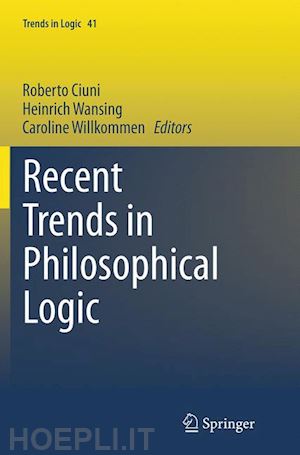

Questo prodotto usufruisce delle SPEDIZIONI GRATIS
selezionando l'opzione Corriere Veloce in fase di ordine.
Pagabile anche con Carta della cultura giovani e del merito, Carta della Cultura e Carta del Docente
This volume presents recent advances in philosophical logic with chapters focusing on non-classical logics, including paraconsistent logics, substructural logics, modal logics of agency and other modal logics. The authors cover themes such as the knowability paradox, tableaux and sequent calculi, natural deduction, definite descriptions, identity, truth, dialetheism and possible worlds semantics.
The developments presented here focus on challenging problems in the specification of fundamental philosophical notions, as well as presenting new techniques and tools, thereby contributing to the development of the field. Each chapter contains a bibliography, to assist the reader in making connections in the specific areas covered. Thus this work provides both a starting point for further investigations into philosophical logic and an update on advances, techniques and applications in a dynamic field.
The chapters originate from papers presented during the Trends in Logic XI conference at the Ruhr University Bochum, June 2012.
Chapter 1. Semantic Defectiveness: A Dissolution of Semantic Pathology; Bradley Armour-Garb and James A. Woodbridge.- Chapter 2. Emptiness and discharge in sequent calculus and natural deduction; Michael Arndt and Luca Tranchini.- Chapter 3. The Knowability Paradox in the light of a Logic for Pragmatics; Massimiliano Carrara and Daniele Chi.- Chapter 4. A Dialetheic Interpretation of Classical Logic; Massimiliano Carrara and Enrico Martino.- Chapter 5. Strongly semantic information as information about the truth; Gustavo Cevolani.- Chapter 6. Priest's Motorbike and Tolerant Identity; Pablo Cobreros, Paul Egré, David Ripley and Robert van Rooij.- Chapter 7. How to unify Russellian and Strawsonian definite descriptions; Marie Duži.- Chapter 8. Tableau Metatheorem for Modal Logics; Tomasz Jarmuzek.- Chapter 9. On the Essential Flatness of Possible Worlds; Neil Kennedy.- Chapter 10. Collective Alternatives; Franz von Kutschera.- Chapter 11. da Costa meets Belnap and Nelson; Hitoshi Omori and Katsuhiko Sano.- Chapter 12. Explicating the Notion of Truth within Transparent Intensional Logic; Jirí Raclavský.- Chapter 13. Leibnizian intensional semantics for syllogistic reasoning; Robert van Rooij.- Chapter 14. Inter-Model Connectives and Substructural Logics; Igor Sedlár.
Roberto Ciuni is Humboldt Postdoctoral Researcher at the Ruhr University Bochum, where he carries his project, ‘A Tempo-Modal STIT Logic for Responsibility Attribution in Many-Step Action.’ His main areas of research are: Logics of Agency (especially STIT), Logics of Rational Interaction, Branching-Time Logics. Among his recent achievements, there is a paper on tempo-modal STIT in Studia Logica 96/3, coauthored with Alberto Zanardo.
Roberto Ciuni Heinrich Wansing is Professor of Logic and Epistemology at Ruhr University Bochum. His main areas of research are: Non-Classical Logics, Modal Logic, Proof Theory and Epistemology.
Caroline Willkommen was a Postdoctoral Fellow at the Ruhr University Bochum. Her main area of research is in the Logics of Agency, particularly BDI and STIT.











Il sito utilizza cookie ed altri strumenti di tracciamento che raccolgono informazioni dal dispositivo dell’utente. Oltre ai cookie tecnici ed analitici aggregati, strettamente necessari per il funzionamento di questo sito web, previo consenso dell’utente possono essere installati cookie di profilazione e marketing e cookie dei social media. Cliccando su “Accetto tutti i cookie” saranno attivate tutte le categorie di cookie. Per accettare solo deterninate categorie di cookie, cliccare invece su “Impostazioni cookie”. Chiudendo il banner o continuando a navigare saranno installati solo cookie tecnici. Per maggiori dettagli, consultare la Cookie Policy.